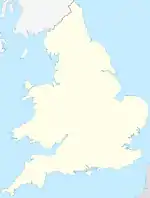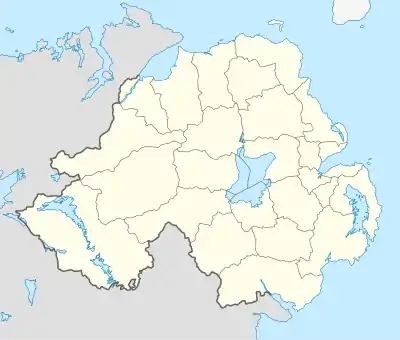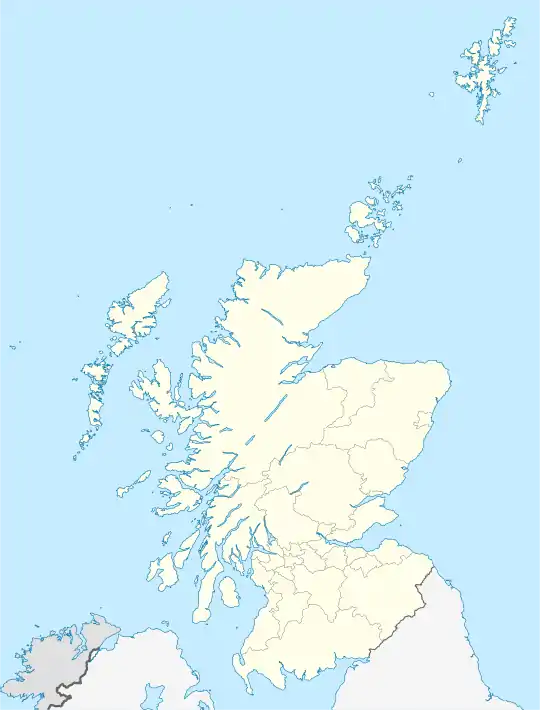2021 United Kingdom census
On 21 March 2021, the decennial 2021 United Kingdom census, called Census 2021, will occur throughout most of the United Kingdom. The census in Scotland will take place in 2022, known as Scotland's Census 2022. It will be administered by the Office of National Statistics (ONS) in England and Wales, by the Northern Ireland Statistics and Research Agency in Northern Ireland,[1] and by the National Records of Scotland in Scotland. Census 2021 will be the first British census to collect most data online,[2][3] and the ONS has confirmed that the census will go ahead despite the COVID-19 pandemic, in part because the information obtained will assist government and public understanding of the pandemic's impact.[4] However, enumeration in Scotland will take place one year later than the rest of the United Kingdom, the plans for it having been delayed because of the pandemic.[5]
| Census 2021 | ||
|---|---|---|
| ||
 | ||
| General information | ||
| Country | United Kingdom of Great Britain and Northern Ireland | |
| Authority | Office of National Statistics National Records of Scotland Northern Ireland Statistics and Research Agency | |
| Website | census | |
Census 2021 comes off the back of Beyond 2011, a project by the UK Statistics Authority to assess the value, cost, and alternatives to a census in 2021. The project recommended a census in 2021, and amongst others, suggested it be run online.[3]
Background
After the 2011 census both the UK coalition government and previous Labour Government expressed concerns about the rising costs of the decennial census. There were also concerns about the value of continuing with the traditional approach adopted for the 2011 census. This included whether collection methods were still fit for purpose in a rapidly changing society and whether census outputs, based on a survey conducted every ten years, would continue to meet the increasingly demanding needs of public and private sector users. Emerging technological developments were seen as providing alternative and improved data gathering opportunities. These concerns and opportunities led the UK Government to question if a supplementary or wholly alternative approach to the traditional 10-yearly census was required; more frequent, possibly annual, small-scale surveys could be employed instead.[6]
In 2011, The Beyond 2011 Programme was established to look at alternatives to the traditional census approach. The UK Statistics Authority coordinated the project which was also undertaken by its counterparts in the devolved administrations of Scotland and Northern Ireland.[7]
In 2014, the UK Statistics Authority announced the recommendation from the Beyond 2011 Programme that there should be a decennial-style 2021 census in England and Wales, which in contrast with earlier censuses, would be conducted predominantly through online completion of census forms, supplemented by the further use of administrative and survey data. Existing census gathering methods would be used only as an alternative, where online methods are not feasible.[8] A parallel announcement for Scotland's 2021 census was made by the National Records for Scotland.[9] The ONS Director, Population and Demography Statistics was reported as saying that an estimated 60–65% of household returns would be completed online.[10]
In April 2014, the British House of Commons Public Accounts Committee (PAC) concluded in its report Too soon to scrap the Census, that the 2021 census should go ahead. It has reservations over the lack of investigation into the options for using administrative data and encouraged the UK Government to reassure the public about privacy concerns.[11]
The Minister for the Cabinet Office welcomed the recommendations for a predominantly online 2021 census for England and Wales supplemented by the use of governmental and other administrative data in a letter to the National Statistician in July 2014. He made clear that the Government saw the dual-running decennial national census with administrative data gathering option as a transitional approach and asked the National Statistician to ensure sufficient research is undertaken both prior to and after the 2021 census to find and validate alternative methods to replace the traditional national census and intermediate surveying approach.[12]
Legislation
Under the Census Act 1920, it is for the United Kingdom Government and Parliament to determine the arrangements for census-taking in England and Wales. Parallel legislative procedures will be required in the devolved administrations of Scotland and Northern Ireland. It will be late 2015 at the earliest before regulations are made. Subject to this legislation being passed the census will be conducted on the same day in England and Wales, Scotland and Northern Ireland to ensure coherence and consistency.[7]
In Scotland, the Census (Amendment) (Scotland) Act 2019 makes provisions for voluntary questions about transgender status and sexual orientation to be asked.[13] The Census (Return Particulars and Removal of Penalties) Act 2019 makes the same provision for England and Wales. The sexual orientation question will also be asked in Northern Ireland.[14]
2021 Census for England and Wales
 | |
| Area | England and Wales |
|---|---|
| Registrar | Professor Sir Ian Diamond (as National Statistician) [15][16] |
| Census day(s) | 21 March 2021 |
| Issuing organisation | ONS |
| Data supplier | Leidos Innovations |
| Rehearsal | September – December 2019. |
| Rehearsal Areas | Carlisle, Ceredigion, Hackney, Tower Hamlets |
| Census forms | Household[15][16] and others |
Coordination
The UK Statistics Authority has the responsibility for coordinating the census arrangements across the United Kingdom through the Office for National Statistics (ONS), which is also responsible for the census in England and Wales.
2021 census research
The 2011 UK census was the first decennial census in the United Kingdom to include the option of completing the census documentation online. Across the UK between 15 and 19% of census forms were submitted online.[17][18] UK Statistics Authority has proposed that the 2021 census should be conducted predominantly online (with support provided for those unable to complete the census online), supplemented by the use of administrative and survey data and improve annual statistics between censuses.[7] For the census in 2021 the proposed target for online completion has been set to at least 65%.[19]
Research has been under way since 2011 to design a new census methodology which maximises the success of an online approach.
Research commissioned by the Beyond 2011 programme identified there were risks associated with over reliance on administrative data drawn from governmental department sources due to process changes, such as benefits and welfare payments and the necessity to include full access to statistical data as part as proposed legislation affecting administrative programmes. Issues identified also included the accuracy of administrative data sets for geographical areas below that of local authorities, problems associated with estimation and the use of address registers. ONS on behalf of the UK Statistics Authority has taken on board the recommendations of the Skinner Report into methodology work and has proposed three research strands to determine the 'optimum blend' of online census, administrative data and surveying methods for the 2021 census and indeed subsequent censuses.[20]
The UK Statistics Authority has commissioned research strands as part of a Census transformation programme which will report by 2017 relate to:- the 2021 census operation, the shape of population statistics in 2021 and, the shape of population statistics post 2021 in the lead up to 2031.[21]
Census work programme
A work programme running until 2024, comprising eight phases, has been developed by ONS.[22]
- Research (ended March 2015)
- Design and prototyping (ended December 2016)
- Testing (2017)
- Development (2018)
- Rehearsal (January 2019 – June 2020)
- Collection operations (July 2020 – December 2021)
- Analysis, output and dissemination (2022–23)
- Evaluation / future planning (2023–24)
Alongside this programme trials of statistics generation using administrative data are planned starting from the autumn of 2015 and running through to 2021 with the aim of ranging across the breadth, detail and accuracy of census outputs.
2021 Census for Northern Ireland
 | |
| Area | Northern Ireland |
|---|---|
| Registrar | Siobhán Carey[23] |
| Census day(s) | 21 March 2021 |
| Issuing organisation | NISRA |
| Data supplier | Leidos Innovations |
| Rehearsal | 13 October 2019[24] |
| Rehearsal Areas | Ravenhill and Queens (Belfast); Armagh, Banbridge and Craigavon (Craigavon); Fermanagh and Omagh (West Fermanagh) [24] |
| Census forms | Household,[23] Individual, and others |
| Website | |
The Northern Ireland Statistics and Research Agency (NISRA), undertakes the census in Northern Ireland.[7]
The NIRSA has published a report reviewing the 2011 census and other online-orientated censuses abroad and identified the importance of such things as pre-census publicity, the use of a unique internet code or ePin, and a coordinated promotion and follow up process during the census completion period.[17]
2022 Census for Scotland
 | |
| Area | Scotland |
|---|---|
| Registrar | Tim Ellis (as Registrar General, Scotland) |
| Census day(s) | March 2022 (exact Date TBC) |
| Issuing organisation | NRS |
| Data supplier | TBC |
| Rehearsal Areas | Dumfries and Galloway, Glasgow City, Whole of Na h-Eileanan Siar |
| Census forms | Household,[25] and others |
| Website | |
The National Records of Scotland (NRS) is responsible for the census in Scotland[26] A rehearsal was conducted on the 7 October 2019 and closed for returns on 7 November 2019 in three local authority areas, namely parts of Glasgow City, Dumfries and Galloway and Na h-Eileanan Siar.[27]
The census was scheduled to take place on the 21 March 2021 but was delayed in July 2020 by the Scottish Government because of the COVID-19 pandemic.[28]
Census in Crown Dependencies
Although it is a Crown Dependency, and not part of the United Kingdom, Jersey will carry out a census on the same day as the 2021 UK census.[29]
Guernsey no longer carries out a decennial census, instead using the Rolling Electronic Census Project to produce regular census reports.[30]
The Isle of Man will also undertake a full census in 2021 (having held an interim census in 2016).[31]
External links
- Census 2021 – Office of National Statistics website for the 2021 census
References
- "2021 Census". Northern Ireland Statistics and Research Agency. Retrieved 5 November 2020.
- "About the census". Census 2021. Retrieved 5 November 2020.
- "The census and future provision of population statistics in England and Wales: Recommendation from the National Statistician and Chief Executive of the UK Statistics Authority, and the government's response". Office of National Statistics. 27 March 2014. Retrieved 5 November 2020.
- Office of National Statistics, The census during the coronavirus pandemic, accessed 30 January 2021
- "Coronavirus: Census delayed by a year because of disease". BBC News. 17 July 2020. Retrieved 5 November 2020.
- Background to Beyond 2011 Office for National Statistics website, Retrieved 30 April 2014
- The census and future provision of population statistics in England and Wales: Recommendation from the National Statistician and Chief Executive of the UK Statistics Authority 27 March 2013, Accessed 23 April 2014
- The census and future provision of population statistics in England and Wales UK Statistics Authority published 27 March 2014, Accessed 1 April 2014
- "Plans for a Census in Scotland in 2021 National Records for Scotland Press Release 27 March 2014". Archived from the original on 7 April 2014. Retrieved 1 April 2014.
- Report from ‘Counting the population: the 2021 Census and beyond’ event 1 May 2014, Accessed 7 May 2014
- Too soon to scrap the Census – UK Parliament Public Administration Committee Report Published 9 April 2014, Accessed 1 May 2014
- Beyond 2011 Research Conference 2014: Summary of proceedings – August 2014, Accessed, 31 August 2014
- Brooks, Libby (13 June 2019). "Holyrood backs new census questions on transgender identity". The Guardian. Retrieved 6 October 2019.
- Cooley, Laurence (2020). "Sexual orientation and the 2021 UK census". European Journal of Politics and Gender. 3 (3): 445–447. doi:10.1332/251510820X15845548424385. ISSN 2515-1088.
- https://www.ons.gov.uk/file?uri=/census/censustransformationprogramme/questiondevelopment/census2021paperquestionnaires/householdenglandpdf.pdf
- https://www.ons.gov.uk/file?uri=/census/censustransformationprogramme/questiondevelopment/census2021paperquestionnaires/householdwalespdf.pdf
- The Future Provision of Census of Population Information for Northern Ireland NISRA, Accessed 30 December 2014
- 2011 Census: Percentage of individual returns via paper and internet questionnaires in England, Accessed 30 December 2014
- Beyond 2011 Research Conference 2014: Summary of proceedings ONS, Accessed 30 December 2014
- Beyond 2011: Independent Review of Methodology ONS, Accessed 30 December 2014
- FAQ Census Transformation Programme, Accessed 25 January 2015
- Planning for 2021 – slides 15/17 – ONS Powerpoint Presentation November 2014, Accessed 30 December 2014
- "NISRA - 2019 census rehearsa evaluation" (PDF). 2019.
- "Scotlands Census - Question Set" (PDF). Retrieved 2021-02-04.
- About Us, National Records of Scotland, Accessed 4 October 2018
- "Census Rehearsal 2019 | Scotland's Census". www.scotlandscensus.gov.uk. Retrieved 2021-02-04.
- "Coronavirus: Census delayed by a year because of disease". BBC News. 2020-07-17. Retrieved 2021-02-04.
- "Census 2021". Government of Jersey. Retrieved 16 November 2020.
- "Population, Employment and Earnings". States of Guernsey. Retrieved 16 November 2020.
- "Census". Isle of Man Government. Retrieved 16 November 2020.